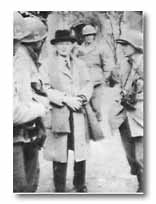
Maurice Gustave Gamelin (September 20, 1872 - April 18, 1958) was a French general. Gamelin is best remembered for his unsuccessful command of the French military in 1940 and his steadfast defense of republican values.
The generalissimo of the French armed forces in World War II, Gamelin was viewed as a man with significant intellectual ability. He was respected, even in Germany, for his intelligence and "subtle mind". Despite this, and his competent service in World War I, his command of the French armies during the critical days of May 1940 proved to be disastrous. Historian and journalist William L. Shirer presented the view that Gamelin used World War I methods to fight World War II, but with less vigor and slower response.
Gamelin served with distinction under Joseph Joffre in World War I. He is often credited with being responsible for devising the outline of the French counter-attack in 1914 which led to victory during the First Battle of the Marne. After the war, he served as a military advisor during the Soviet-Polish War. In 1933, Gamelin rose to command of the French Army and oversaw a modernization and mechanization program, as well as the completion of the Maginot Line defenses. Edouard Daladier supported Gamelin throughout his career due to his refusal to allow politics to play a part in military planning and promotion, and his commitment to the republican model of government.
Gamelin's vision for France's defense was based upon a static defense along the Franco-German border, which was reinforced by the Maginot Line, and an aggressive advance northward into Belgium and the Netherlands to meet the attacking German forces as far removed from French territory as possible. To this advance, known as the Dyle Plan, Gamelin committed much of the motorized forces in the French Army and the entire BEF. The German attack occurred further south than Gamelin had gambled, and the forces he sent into the Low Countries were quickly cut off. This disaster undermined the overall Allied position to such a degree that Britain abandoned the conflict on the continent, the Dutch surrendered within days, the Belgians in a little over two weeks and the French were left with only a rump of their former army to defend their nation. Gamelin was removed from his post on May 18, 1940 by Paul Reynaud, who had replaced Edouard Daladier as Prime Minister earlier in the month.
Gamelin was both preceded and succeeded as generalissimo by Maxime Weygand. During the Vichy regime, Gamelin was arrested and unsuccessfully tried for treason along with other important political and military figures of the Third Republic (Edouard Daladier, Guy La Chambre, Léon Blum and Robert Jacomet) during the Riom Trial. At this trial, Gamelin refused to answer the charges against him, instead maintaining a dignified silence. He was later deported to Germany. After the war he published his memoirs titled Servir....
 Lefthit
Lefthit